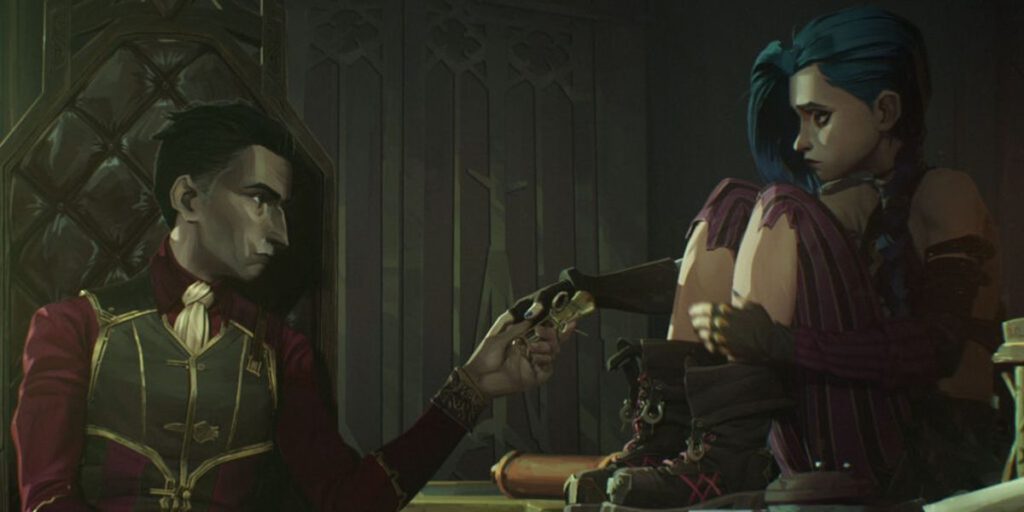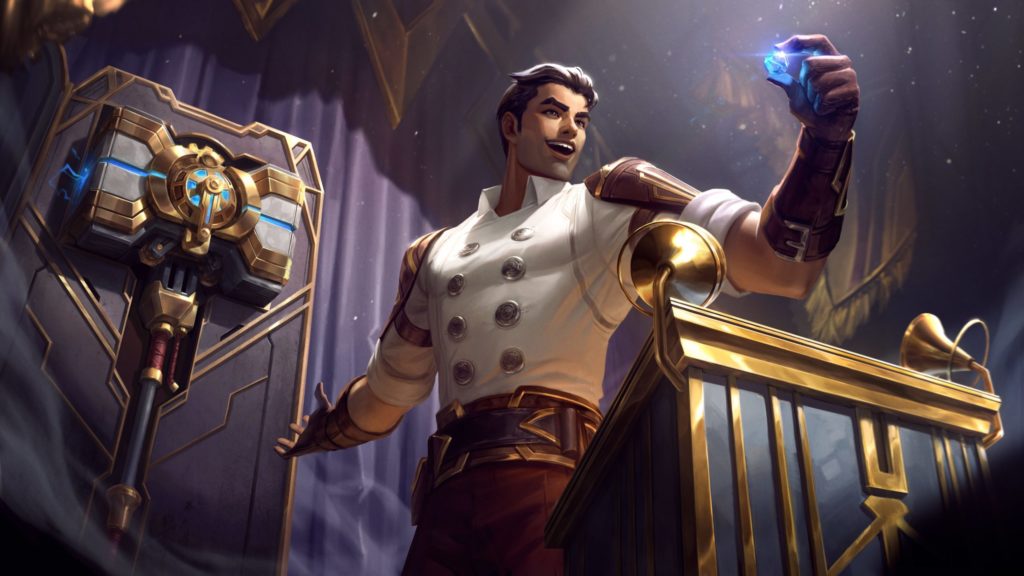Warning: This article contains spoilers for Netflix’s Arcane.
Spawned from the popular game universe of League of Legends, Arcane is a beautifully animated adult Netflix show depicting the complex relationship between two sisters, Vi (Violet) and Jinx (Powder). Produced by Fortiche and supervised by Riot Games, Arcane is a production that combines avid gamers with regular film watchers.
When I first heard about the show, I have to admit, I was skeptical. Gaming culture, especially in League of Legends, is sometimes incredibly toxic. But after the first episode, I was hooked. Incredible animation aside, the characters and their relationships were intricate and multifaceted; so many parallels can be drawn to real life, such as Jayce’s discrimination towards the undercity and Jinx and Silco’s strange but pure relationship.
For those who haven’t seen the show, here’s a short overview: There are two sides of the city—the Under City of Zaun and the Upper City of Piltover. The Under City is flooded with poverty, whereas the Upper City flourishes with riches; with these dynamics, there are systematic differences between the two. The show starts with Vi and Powder with their gang, Mylo and Claggor, discovering Arcane energy, which will then form the basis of Jayce’s company, Hexcore. Silco, the show’s ‘villain’, creates Shimmer, an addictive drug-like substance that turns people into animalistic killing machines.
When Silco kidnaps Vander, the gang’s father figure, Vi and her gang attempt to save him. They were nearly successful, but Powder appears and attempts to save them by creating a bomb using Arcane energy. Powder’s bomb unfortunately blows up the entire building, killing Mylo, Claggor, and Vander. With Powder ridden with guilt and Vi fuming with anger, Powder runs into the hands of Silco and Vi leaves her, getting arrested and put into jail for the next few years. Silco then raises Powder—now named Jinx—as his own. Meanwhile, in the Upper City, Jayce develops Arcane magic in Hexcore, with the intention of helping those in the Under City. Throughout the show, Vi goes on a journey to find Jinx but falls in love with an Upper City sheriff named Caitlyn, whereas Jayce derails the intentions of Hexcore with his partner, Viktor, all while tensions are strung high between the two cities.
Perhaps the two most hated yet lovable characters are the deadly duo—Jinx and Silco. If this were the classical Hollywood era, they would be the characters we, as the audience, are supposed to hate. Jinx murdered her friends. Silco is a criminal who feeds the poor with an addictive drug to gain power in the empire he calls Zaun. But there’s more to the story than that—there’s depth to their characters, and now we reach ambiguous territory. Do we hate them? Are they just victims of injustice and capitalism? It’s evident that Silco is a bad person: selling (the drug) Shimmer to feed himself, but also to care for Jinx. One could argue that he didn’t have a choice. In the Under City, you’d do anything for money, but admittedly, his ways are in no way moral. Then why can’t we truly hate him?
Silco’s undertaking of Jinx unveils an entirely new side to him. They form a pure-hearted, unconditional, yet sinister relationship. Silco sees Jinx as his “adoptive” daughter. He loves her like a daughter. In Episode 9, Silco says, ironically, to a statue of Vander: “Is there anything so undoing as a daughter?” Silco raised Jinx, but Vander raised Powder. There are multiple interpretations of Silco’s use of ‘undoing’—perhaps he is referring to her as the cause of his downfall, which in this sense, suits Jinx’s name perfectly. She’s his Achilles heel. Or, it could be more literal. Jinx loosened something in him: the ability to love someone unconditionally. No matter how many times she makes mistakes, he will always defend her. She fumbles every mission, yet both Silco and Vi can’t stop loving her. She’s a curse that they can’t get rid of because they care for her.
Jinx and Silco’s relationship wasn’t perfect. The circumstances of their bond weren’t ideal; he only took her in because Vi had left, then fed her lies about her past. Silco took Powder in, but he made Jinx, and maybe that’s the only reason he loved her. When Jinx kills Silco in one of her manic episodes, his last words to her are, “Don’t cry. You’re perfect”. He is the only one that accepts her for what she really is because he created her. He never loved Powder. In fact, he murdered her in his baptism: a conniving man manipulating a vulnerable woman, an eerie echo of Harley Quinn and Joker. He only ever loved Jinx—she was his broken toy.
The conditions of Jinx and Silco’s relationship, among many others, only exist because of the duality of Zaun and Piltover, and Jayce’s obvious privilege in the capitalistic system of Piltover is something that reflects real-life society. The Upper and Under cities are complete opposites: the upper-side is kind, trusting, and lives comfortably, but the under-side civilians are cynical, poor, and violent. People raised in these two societies have stereotypical polar outlooks on life. When Viktor, who is from the Under City, tells Jayce that he consulted a friend about an issue, Jayce’s response reveals his inherent classism; he exclaims, “Well, you didn’t say they were from the Under City… they’re dangerous,” suggesting that he disproves any communication with them. Viktor then states harshly: “I’m from the Under City,” shattering any of Jayce’s misconceptions. Those in Zaun are stereotyped as violent because they would go through any means to earn money, or in other words, survive. But one cannot truly blame them—in fact, I’d rather blame Piltover. The Upper City has the resources to help others, yet they hoard them for the mere fact that they believe citizens of Zaun are not ‘worthy’ enough. The Upper City pushed Zaun into this poverty, and the council only enforced these stereotypes to feed their capitalistic system.
Despite the initial vision for Hextech, which was to help those in the Under City and lessen the gap between them, Jayce ultimately fails because of his shielded privilege. It is only when he visits Silco’s production center for Shimmer that he realizes how severe the situation is: there are child laborers working, and Jayce even accidentally kills one of them in the rampage. Upon looking at the dead child’s body, it sinks in—Zaun is much more far off than he knew. To him, it was beyond saving. Then, being a true elitist, Jayce makes the decision to disconnect the cities. Silco strikes a deal with him: complete independence and power over Zaun in exchange for the discontinuation of Shimmer. Instead of using his status and wealth to bring a better future for the Under City, he, with full conscience, decides to let it rot.
Despite League of Legends‘ popularity and toxic game community, Arcane invites players new and old to take a nuanced examination of its rich lore and reconsider the structures of the world around us beyond the screen. It’s entertaining and well-animated, yet carries multiple references to real-life; the characters are so well written, with layers of flaws and a multitude of intricate relationships to be analyzed.
Putting the entertainment aspect of the show aside, what can we take away from Arcane? To me, it is the similarities to real life, as illustrated by the rivalry of Zaun and Piltover. Every action made by the characters was influenced by their background—and to think how everything would’ve been different if they were presented the same opportunities.

